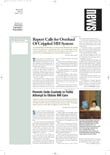What happens when a young adult with schizophrenia comes into the classroom to talk with students about his or her illness?
It can markedly change the students’ attitudes towards persons with schizophrenia, a program conducted in Leipzig, Germany, demonstrates.
The project, called “Verruckt? So Was!,” whose English translation is “Crazy? So What!,” is the brainchild of Beate Schulze, M.D., a Leipzig psychiatrist, and other members of a nongovernment organization called Irrsinnig Menschlich. At the start of the academic year 2000-01, Schulze and colleagues sent information about the project to various high schools in Leipzig. Some 90 students from five high schools decided that they wanted to participate.
First, the participating students discussed their personal experiences regarding mental health and emotional well-being. In this way, they came to understand how anybody can become mentally ill. After that, an individual who was between 18 and 26 years of age and who had schizophrenia came into the classroom to meet with them and tell them about his or her illness—for instance, how the illness developed, how other people have reacted, what has helped him or her get better. The students were then able to question the speaker.
Schulze and her coworkers also assessed the students’ attitudes toward individuals with schizophrenia at the start and end of the weeklong project. This way they could determine whether the project had helped dispel negative views the students may have held. It had, they determined—there was a statistically significant change, and toward the positive.
Schulze and her team likewise assessed the attitudes toward individuals with schizophrenia of 60 students who had not taken part in the project. There was little change in their attitudes, the researchers found. In fact, their attitudes became a little more negative as time went on.
Since the project was completed in 2001, Schulze told Psychiatric News, “Irrsinnig Menschlich has been conducting training workshops throughout Germany, equipping service users, family members, teachers, student representatives, and mental health professionals with the tools and expertise to set up their own projects based on the model of ‘Crazy? So What!’ ”
At the same time, she added, “Several regional ministries in Germany have taken the project on board in official school curricula and education programs. Initiatives in this regard have been launched by the Ministry of Education in Brandenburg and the Ministry of Health in Rhineland-Pfalz. Further negotiations are under way with the regional governments of Hesse and Schleswig-Holstein.”
“The first German-Slovak project week is currently being prepared.” Schulze said. “It is to take place at a Bratislava secondary school, involving teachers, students, as well as young people from both Germany and Slovakia who have had a mental illness.”
More information about the project “Crazy? So What!” is posted on the Web at www.irrsinnig-menschlich.de. ▪
